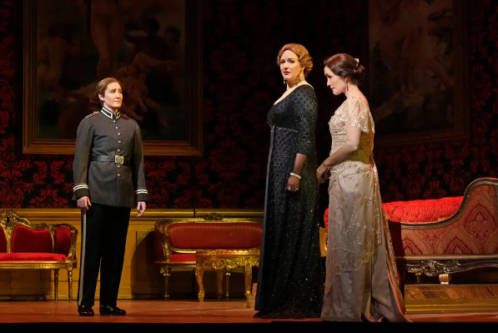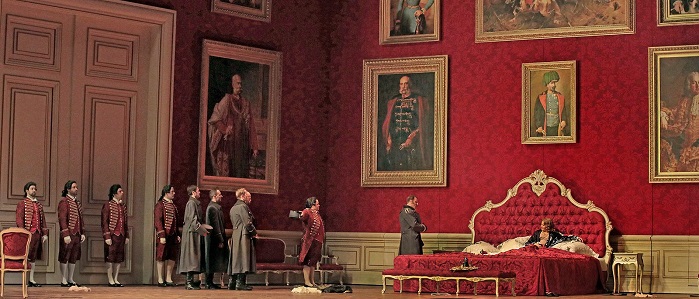 United States The Met: Live in HD – Richard Strauss, Der Rosenkavalier: Soloists, Chorus and Orchestra of the Metropolitan Opera, New York / Simone Young (conductor). Broadcast live to the Cineworld Basildon, Essex, 15.4.2023. (JPr)
United States The Met: Live in HD – Richard Strauss, Der Rosenkavalier: Soloists, Chorus and Orchestra of the Metropolitan Opera, New York / Simone Young (conductor). Broadcast live to the Cineworld Basildon, Essex, 15.4.2023. (JPr)

After a 2017 The Met: Live in HD transmission of Der Rosenkavalier in Robert Carsen’s production – with Renée Fleming and Elīna Garanča bidding farewell to their roles as the Marschallin and Octavian – I wrote ‘I may well “retire” this opera too and not see it again’. That was mainly because – as with a very few operas – I return to them time and again attempting to discover why they are so admired. Rosenkavalier is one of those and I wasn’t overwhelmed by it in 2017. But what a difference the intervening six years have made, possibly perhaps due to stage director Paula Suozzi and the talented cast, it was the most enjoyable Rosenkavalier I can remember, and actually I laughed out loud several times! So, I may not rush to watch another one soon in case I am disappointed again.
For a Rosenkavalier the choice mostly becomes one of deciding between Viennese nostalgia or Viennese decadence. The former is best served by setting the work in an opulent, chocolate-boxy, mid-eighteenth century Hapsburg palace or – as Robert Carsen presents us with – fin de siècle Vienna around the time of the opera’s composition (1910). This was on the cusp of the First World War and when times were changing in many strata of Austrian society. Richard Strauss and Hugo von Hofmannsthal – respectively the greatest German composer and librettist of the early-twentieth century – were collaborating for the second time and Rosenkavalier has become one of Strauss’s most popular operas despite some early unfavourable critical opinion and that both composer and librettist were ultimately somewhat dissatisfied with their creation.
Rosenkavalier is a poignant portrait of human relationships and class envy, but also something of a neo-Baroque comedy of manners in the same vein as Mozart’s Le nozze di Figaro. Indeed, the first scene with Octavian (the ‘trouser role’) dressed up as a maid is clearly a hommage to Cherubino; though the liberalism of the early-twentieth century is also reflected by having Octavian and Sophie unite to drive out the old aristocracy and its decadence, as epitomised by Baron Ochs. Several things in Rosenkavalier seem remarkably modern: the Marschallin’s self-consciousness, the very open and frank sensuality in the opera, as well as its scathing critique of blundering masculinity. The Marschallin’s arrival at the end of the opera supplies one final twist too as she describes all the goings-on as just ‘a farce’ and by displaying her moral authority and dispensing the traditionally noble values of discretion, benevolence, and personal self-sacrifice – in magnanimously pardoning the young lovers who have conspired against her – she orchestrates the expected happy ending. Though as the various social classes finally coalesce – and there is the juxtaposition of a princess, a count, a baron, a newly-ennobled Faninal, with the various servants of different rank – it indeed seems rather more appropriate to the mid-eighteenth century, rather than the Vienna milieu of the early-twentieth century which Paul Steinberg’s sets (looking so huge on the Met stage) and Brigitte Reiffenstuel’s costumes draw us into.

As the curtain rises, Octavian emerges into a hallway in post-coital bliss and needing a cigarette. Still in her nightgown the equally satisfied Marschallin joins him. A wall rises taking us to the bedroom with its enormous bed and we are in a typical Viennese palace though as the back door opens – because of all the portraits on the walls both inside and outside – it looks more like the galleries of Vienna’s Kunsthistorisches (Art History) Museum. Baron Ochs barges his way past the Marschallin’s many servants and insists on seeing her. Ochs has arranged a marriage to Sophie, the daughter of Faninal – shown here as an arms dealer – in order to help alleviate his financial woes. Boasting of his success at seducing peasant girls on his estate, Ochs asks the Marschallin to recommend a young man to serve as his Rosenkavalier (Knight of the Rose) and take Sophie the traditional silver engagement rose, and she suggests Octavian. Ochs also cannot keep his hands off ‘Mariandel’, a young chambermaid (who is actually Octavian in disguise). Chaos soon ensues, as the Marschallin receives various petitioners and is entertained by an Italian tenor (René Barbera, both splendidly costumed and singing too, as Caruso shown eager to sign his gramophone records). I must be rather controversial here: for me there is little point to this scene as it only helps to extend the entire opera beyond the length appropriate for a slim story with only four significant characters.
Faninal represents ‘new money’ and his reception room – decorated in ‘Secessionist style’ – is dominated by two gigantic cannons on their carriages and his lackeys brandish weapons. Striving for upwardly mobility Faninal plans to marry Sophie off to a baron regardless of how penniless he is. After a hint of the Vienna Opera Ball with eight waltzing couples there is love at first sight when Octavian presents the silver rose to Sophie who is suitably appalled when she meets Ochs. All is resolved in Act III as Octavian plots to embarrass the philandering Ochs. The libretto asks for a private room in an inn, but Carsen and his associates take us to a high-class brothel where scantily clad women ‘entertain’ their customers. Looking like the lovechild of Danny La Rue and the late Paul O’Grady’s Lily Savage, the innkeeper (Tony Stevenson) is in drag and Mariandel – Octavian in disguise once more – looks like the Marlene Dietrich of two decades later.
At the end the Marschallin returns, as previously discussed, to restore the status quo before leaving on the arm of the Police Commissioner (Scott Conner) suggesting that as one affair is over another might be beginning. After this false ending there is still time for Strauss to give us a final, sublime and ecstatic love duet for Sophie and Octavian who embrace on the bed. As a stark reminder of what is in store for all these characters, a drunken Mahomet (Billy Conahan) – supposedly the Marschallin’s page retrieving Sophie’s handkerchief – appears to be leading soldiers over the top to their deaths during a future battle.
In this comedy of manners Günther Groissböck didn’t always seem at his ease with the comedy, though he undoubtedly relaxed more into the role as the opera went on and his Ochs was suitably pompous, boorish, guilty of self-aggrandisement and a potential threat to all women (the younger the better I suspect). He obviously relished some amazing low notes (and high ones) and Groissböck has all the vocal stamina a Baron Ochs requires. Some of his best moments were his final ones as Groissböck brought real pathos to the ignominy Ochs endures and considerable dignity to the appreciation that his cause was lost. Erin Morley was an utter delight as Sophie, and she proved to be a natural comic actor. Very much the ‘modern girl’ and ‘catalyst for change’ she described her character as in her backstage interview and her teenage Sophie was someone who knew her own mind and was not willing to settle for second best. What an appealing voice Morley has at her command too, and I cannot wait to see her as Pamina in the Met’s new Die Zauberflöte.
Lise Davidsen – singing her first Marschallins – was at her best when capturing the more sentimental, elegiac side to Rosenkavalier and particularly when reflecting on the passing of time: notably, the Marschallin’s Act I reflections on that and forced marriage (‘Da geht er hin…’) and at the conclusion of Act III joining Octavian and Sophie in the – here incandescent – trio (‘Marie Theres’!” / “Hab’ mir’s gelobt’) as the Marschallin gives Octavian up to the woman he now loves. Nevertheless, earlier in the opera I was impressed by the genuine chemistry Davidsen’s Marschallin had with velvety-toned mezzo-soprano Samantha Hankey, who was as believable a love-struck teenage boy, Octavian, as she was wonderfully convincing as boy-as-girl, Mariandel. Hankey also has a wonderful ability for vocal mimicry, essential for Octavian as Mariandel.
Factoring in all the eye-catching vignettes (especially Brian Mulligan’s stalwart Faninal, Tony Stevenson’s amusing Innkeeper and the conspiratorial antics of Katharine Goeldner’s Annina and Thomas Ebenstein’s Valzacchi), the fine chorus and magnificent orchestra, this was a memorable performance, especially because of Simone Young’s return to the Met’s orchestra pit for the first time since 1998. Together with her musicians, Young conjured up the sumptuous Straussian soundworld to dazzling effect, bringing out all the echt-Viennese schmaltz, lyricism and drama.
My final words are left to Günther Groissböck and his explanation to the (stunned) host of this broadcast, Deborah Voigt, about the difficulty of the ensemble singing in Act I: ‘He [Ochs] never shuts up, and it’s really dangerous because you’re not only responsible for yourself and for beautiful singing and whatever; it’s very dangerous if you – may I say – f**k it up you get a problem also for the others and you have to be really, really careful in what you do. I call it driving, texting and eating, which is not allowed.’
Jim Pritchard
Production:
Production – Robert Carsen
Stage director – Paula Suozzi
Sets – Paul Steinberg
Costumes – Brigitte Reiffenstuel
Lighting – Robert Carsen and Peter Van Praet
Choreographer – Philippe Giraudeau
Cast included:
Marschallin – Lise Davidsen
Octavian – Samantha Hankey
Sophie – Erin Morley
Baron Ochs – Günther Groissböck
Faninal – Brian Mulligan
Annina – Katharine Goeldner
Valzacchi – Thomas Ebenstein
Italian Singer – René Barbera
Innkeeper – Tony Stevenson
Police Commissioner – Scott Conner
Leopold – Patrick Stoffer
Live in HD director – Gary Halvorson
Live in HD host – Deborah Voigt
